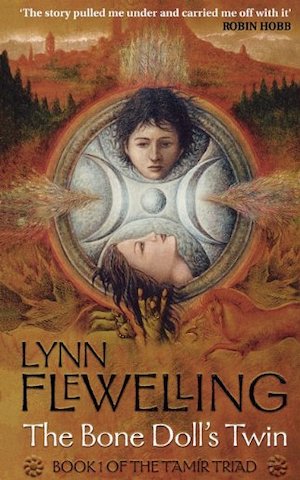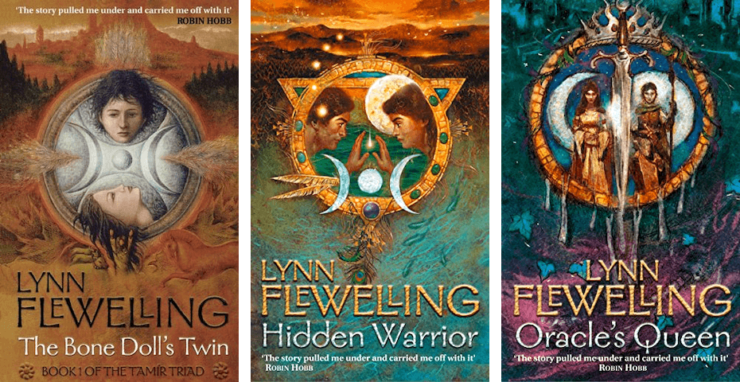The first time I picked up The Bone Doll’s Twin, the first book in the Tamir Triad, I was in a dusty library in Calcutta. I’d recently discovered a room off the main building, lined with ceiling to floor bookshelves, dedicated entirely to science fiction and fantasy. I was probably around 12, and I didn’t know I was about to fall in love.
The Tamir Triad is a trilogy about a kingdom called Skala, in which according to prophecy, the matrilineal line of the King Thelatimos reigns. However, King Erius has seized power and has started to kill off the female heirs who can be contenders to the throne. The latest target is his beloved sister, who’s about to give birth to twins. A pair of wizards, guided by Illior, work with a hill witch to change the girl child’s gender so she’s brought up as a boy until she’s old enough to rule. The series follows the trials and tribulations of this motley group and the other court players as Tamir, raised as Tobin, navigates a world where she doesn’t even know the truth about herself.
This series is a prequel of sorts to Ms. Flewelling’s more well-known Nightrunner series, where she continues her themes of throwing conventional gender and sexuality norms out the window and imagining a more inclusive world. The Tamir Triad does so many things exceptionally well—there are also several horror elements in these books, and I will forever be haunted by images of Tamir’s dead mother up in the tower of the keep. In the book, Tamir’s actual brother is killed so she can take his form, and the angry spirit stays close to her all her life, doomed to watch her live the life he would have had. Every time he appears on the page, you’re choked with both fear and pity. The havoc these hard choices play on the family dynamics is also explored in a sensitive, honest way—you can see all sides to the story. Real horror is personal, and that’s something that this book taught me as well. After all, what’s scarier than family?
This trilogy was a revelation in so many ways. The first book was published in 2001, and not only were female characters major driving forces, they also traditionally held power, and lived in a world where patriarchy was a new and strange thing—so unlike many classic fantasy stories. Many women clearly chafe in a world where once they were priests and queens and warriors and all of a sudden, the rules have been switched up on them and they’re relegated to the background. I also loved how the cost of magic meant being infertile and the female wizard mentions this in a throwaway line and never loses her head about it. (Looking at you, Black Widow and the Witcher.) It also was the first book I’d ever read to really make me question the way I thought about gender. This book asked—if you were a different gender, would you be the same person or would you be different? Is your personality really that inherently tied to how you outwardly present? For me, I know that it is not. Much like the protagonist, to me, gender really seems to be more about how other people react to you, rather than the person you are at your core.
Buy the Book


The Bone Doll’s Twin
Tobin eventually transforms by cutting out the shard of bone sewn into his skin that links him to his brother, and takes her true form as Tamir. But when the switch back happens, the trouble is more with the people around (him? her? them?) changing the way they react to her. Some relationships are tested, others transition more smoothly, because changing gender doesn’t change the way people who love you feel about you. Many people take it in stride, but throw in romance and it becomes a more volatile situation. Ki, Tobin’s longtime friend and swore squire, has the hardest time with the transition because their situation is so complicated—he misses his friend, and court etiquette demands changes in their constant companionship. Tamir on the other hand, who has had long time feelings for Ki, wants him to pretend that nothing has changed. There’s angst aplenty for those who love it, and I for one do. Their relationship grows organically, it’s never rushed, and although none of us have actually fully shed our outer body in front of our friends and family and a watching crowd, it’s very relatable. The books also explore gender dysphoria either way—once he knows, Tobin never feels right as a boy; Tamir takes a long while to become accustomed to her body as a girl. She’s of course far more comfortable in her male identity, but a lot of it has to do with familiarity. All of this was such a radical change for me as a long-time fantasy fiction reader, and I love these books for it.
There were also many different ways that the book made sense to me that I’m not really sure that the author intended. Being a Hindu, it felt natural to deal with a land of polytheistic gods, where different gods governed different things and were treated equally, and all the little rituals and quirks co-existed harmoniously. The racism against the hill tribes, the way they were treated with both fear and disdain and looked down upon for being small and dark and communing with nature, went hand in hand with how the adivasis, or tribes of India were treated. Fear of their magic done with blood and bone and other human bits and pieces fit right in, as my mother told me to spit thrice on my nail clippings as I threw them away so no one could use them to do black magic. Even Tamir’s beloved nurse held the name Nari—a Hindi word that means woman. Tamir’s father’s best friend is named Tharin, and I went to school with not one but two girls named Tharini.
I think that’s really the ultimate takeaway for me. The fact that these were books that were well intentioned and diverse, but as a writer, you really can’t know what your readers will connect with. To be fair, I am the kind of person who reads about someone’s skin looks brown in the sun and assumes they’re a POC. It was only many years later I realised that other people do not read SFF in the same way, or choose only to see the parts they want to see. It’s been eye opening to see that a lot of books are way whiter and straighter than I thought they were. Especially now that everyone’s favourite children’s author is running amok and alienating her most marginalized readers, I think it’s important to understand that you cannot control how someone is going to read your book, or know what perspective they’re going to read your story through. You may be an author sitting in Maine and putting out one story, but a world away, one little girl sitting in Calcutta is going to read a very different one.
I just wish I could gush over these books with more people, because I’ve never actually met another person who’s read them. I know they exist, of course, because I see the reviews on good reads and the mentions on twitter. But it’s wild to me that this book, with blurbs from George R.R. Martin and Robin Hobb on the cover, this book that is in my opinion some of the best fantasy I’ve ever read, isn’t more widely known. It’s a travesty.
So please, if you can, pick up copies of these books (The Bone Doll’s Twin, followed by Hidden Warrior and The Oracle’s Queen) and come talk to me about them once you’re done. I can’t wait to finally get to talk about how Ki is the book boyfriend to beat all book boyfriends.
Molly Majumder has an MA in writing and publishing from Emerson College. After several internships at literary agencies and small presses, she finally landed her dream job as an editorial assistant at Tor Books. Now she spends most of her time trying to get cats to like her.










